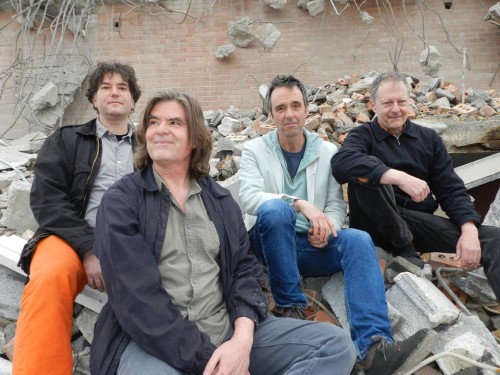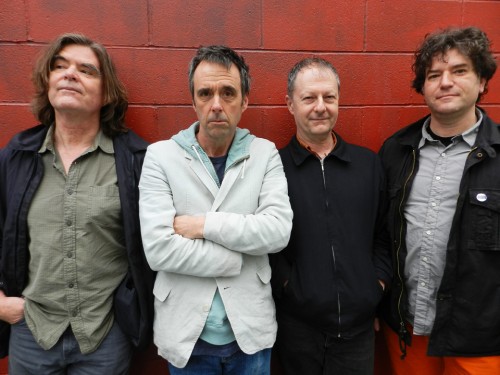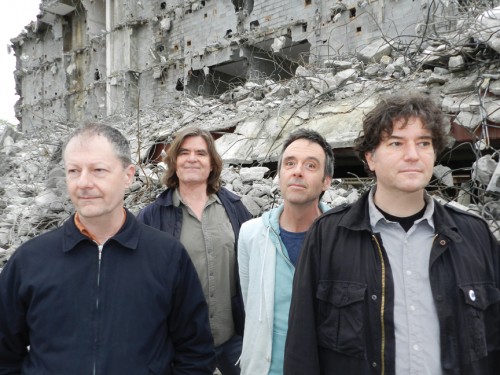This Is Not a Photograph, It’s a Hi-Fi: Mission of Burma Never Slows Down Again
 Okay, so let’s say you’re in an indie-rock band. (I mean, c’mon, isn’t everybody, these days?) If you do, well, you owe Boston punk experimentalists Mission of Burma a big, big debt. I know that sounds like a pretty far-fetched blanket statement to make, and the band themselves would certainly scoff at the idea, but trust me, I’m not wrong on this.
Okay, so let’s say you’re in an indie-rock band. (I mean, c’mon, isn’t everybody, these days?) If you do, well, you owe Boston punk experimentalists Mission of Burma a big, big debt. I know that sounds like a pretty far-fetched blanket statement to make, and the band themselves would certainly scoff at the idea, but trust me, I’m not wrong on this.
Any indie-rock-ish band since at least the early ’90s, anybody who rides the link between post-punk intelligence and experimentation and raw, heavy punk fury, is essentially walking down a road the quartet — guitarist Roger Miller, bassist Clint Conley, drummer Pete Prescott, and tape-loop manipulator Martin Swope (now replaced by Shellac‘s Bob Weston) — blazed through the musical wilderness of the early ’80s.
They were raw, they were loud, they were obtuse and experimental just because they could be, and they were, well, catchy, to boot. When they played, it sounded less like a performance and more like a fight, like men wrestling with their instruments, which were alive and sentient and didn’t want to give up those amazing sounds that easily.
Seriously, Mission of Burma were pioneers when it came to merging the spiky, sharp-edged guitars of Wire and Gang of Four with the fist-pumping anthems of Hüsker Dü, bridging the gap between British post-punk and American proto-hardcore. Other bands had come near, but before Burma came along, nobody had really, truly made it work, crafting songs that managed to be both fiendishly avant-garde and addictive (just try to not sing along to “That’s When I Reach For My Revolver”) while blurring the edges so smoothly you forgot they ever existed.
Then, after releasing an EP (Signals, Calls, and Marches), one full-length (Vs.), and a couple of singles, they called it a day. Miller’s tinnitus was getting worse, making it harder and harder to play live, so Mission of Burma broke up, only releasing a posthumous live album and a smattering of compilations over the next two decades.
And then, they came back. In 2002, the band reformed, pulling together three of the original four members and replacing Swope with Weston on the tape loops. After playing together again for the first time since 1983, they kepy on rolling — and better still, started recording again. The next ten years saw three more albums, 2004’s ONoffON, 2006’s The Obliterati, and 2009’s The Sound The Speed The Light, and this July they released their fourth, the brand-new Unsound, on Fire Records.
Every band you like? They grew up liking this band. Superchunk, Jawbox, R.E.M., Fugazi, Guided by Voices, hell, even Pearl Jam, for crying out loud, they’ve all pointed to Mission of Burma as an influence or inspiration. “Revolver” has been covered by everybody from Catherine Wheel to Pegboy (which is how I first heard it, actually, back in college) to freaking Moby.
Which makes listening to Unsound an odd experience, I have to say. It’s an utterly brilliant album, one that’s damn-near impossible to stop listening to, but I keep running into these “hey, that sounds like X…” moments, only to realize, no, it’s actually “X” sounding like Burma. It’s almost the same way I felt the first time I heard all of Are You Experienced? — all of a sudden, all those other bands that came after made a hell of a lot more sense.
After barreling through the album, then, SCR reached out to Roger Miller to ask him a few questions before the band’s show this Thursday, September 13th, at Fitzgerald’s. It was a little nerve-wracking; Miller’s honest-to-God one of my musical heroes, and I was terrified I’d screw it up and ask nothing but stupid questions that he wouldn’t waste his time answering, and yet, he did. So here goes.
 SCR: After reuniting in 2002, you’ve now been back together for twice as long as you were a band the first time around; how has that worked out for everybody? Are you all in very different places now from where you were back then?
SCR: After reuniting in 2002, you’ve now been back together for twice as long as you were a band the first time around; how has that worked out for everybody? Are you all in very different places now from where you were back then?
Roger Miller: Well, we’re no longer only living for being in the band like we were in ’79/’82. This is, overall, good! We are not obligated to be on tour all the time, yet we still play gigs and make records in a more relaxed fashion. The interesting thing is that we all still get along and are having a blast!
When along the way these past 10 years did you realize, “hey, this isn’t just a let’s-get-the-band-back-together?” temporary reunion? Or did you envision it as being Mk. II right from those first reunion shows?
First shows were only going to be one show in Boston, one in NY. When it became three in Boston and two in NY, that was already a sign… Then we got an offer to play at ATP in the UK — Shellac was curators — and we never played there back in the day, so we couldn’t pass it up.
It just kept on going, seemed to have a life of its own. There was never any plan, that’s for sure. Our “horizon” is usually two or three months ahead, and we rarely know what will happen after that. When we found we had enough songs to make a new album, ONoffON, we were forced by the situation to do it — certainly we never planned to make a new album when we reformed…
If you could go back to 1983 knowing what you know now, with all those bands whose music bears your stylistic imprint, do you think would you still call it a day?
Would have had no effect on the situation. Honestly, the only reason we — are forced to — believe that we influenced other bands is by reading it in the press. We don’t hear it, actually.
What’s your songwriting process generally like? Does one person do the bulk of the songwriting, or is it a shared thing?
Always one person brings a song in. Sometimes it gets changed a lot, sometimes barely at all. Song by song. But each song is very much a personal act. We write it on our own. But no matter who writes the song, it gets Burmanized pretty badly!
Along similar lines, was the recording process a contentious thing? Unsound has this desperate, “struggling” feel to it at points, like you’re fighting against something, and it’s hard to imagine everybody stepping cheerily into the studio and breezing through these songs.
Oh, that “struggling/desperate” feel is just us having a good time! No contentions whatsoever. The only thing is making sure we got a good take of each song. The recording of Unsound was probably the most casual session we’ve ever done. We’re just naturally in a state of personal despair!
It’s funny, but listening back to your older stuff, it actually sounds relatively poppy when you compare it to the state of music today; do you think the musical world’s finally caught up?
Poppy? OK, if you think so! We are still very much “on the edge” of the music world. Perhaps some aspects of our music have become more “normal”, but we still feel like outsiders.
The bit about the “pop” sound aside, one of my favorite aspects of the band has always been the tape loops; was there any question as to whether or not that would continue with the reconstituted band? How has it affected the sound, having Bob Weston in the band as opposed to Martin Swope?
Never a question — it was just who was going to do it! Martin opted out, and eventually we hit upon Bob [Weston]. I can’t really recall how that happened, but it has been a total boon. We all have worked with Bob before — Pete in Volcano Suns, as a bassist, Clint with Consonant, as a producer, me with Xylyl, on trumpet — and we all got along jim-dandy with him. He is a little more upfront with his loop manipulations than Martin, I think. But overall, it’s pretty similar.
While the music on Unsound is definitely Burma, it does sound a little different — a little more thoughtful, maybe, and even a little funkier, and then there’s the horns, of course. Did you go into the recording of the album specifically planning to do something distinct from the previous albums?
We wanted to push the envelope a bit on this one. And we did. I used a different amp setup — closed-back cabinet — which gives a more guttural guitar sound, and we recorded it in our rehearsal space, which made things more natural.
I had wanted to write trumpet parts for a while — I played cornet on “New Nails” on Vs., and Bob played trumpet in Xylyl — and when I brought it up to the band, I was happily surprised to find an approval! Overall, people seem to have found the horns unusual, but integrated into our sound.
 I generally think of you guys as sounding somehow “British,” believe it or not, despite being a decidedly American band. Which side of the pond do you tend to look to in terms of influences?
I generally think of you guys as sounding somehow “British,” believe it or not, despite being a decidedly American band. Which side of the pond do you tend to look to in terms of influences?
At first, NYC: Ramones, Television, No New York. After the New York Punk explosion, the UK seemed to have more new ideas. We were definitely influenced by Wire. People often note similarities with Gang of Four — even our name! — but as I’ve mentioned before, some of our most “Gang of Four”-like songs were written before we ever heard Gang of Four. We were certainly fans of them, though. Hugo [Burnham] joined us on drums for an encore in our first BOS shows in 2002.
Are there any bands you’re particularly into these days?
We are fans of Future of the Left. Fucked Up. Neptune in Boston.
How about in Boston? Do you follow the scene there? I’m curious in part because I’ll actually be up in Cambridge next week; any bands you’d recommend?
Neptune, of course. Black Helicopter is quite good, too — very heavy.
Just out of curiousity, what prompted the shift from Matador to Fire Records?
Both us and Matador felt like we’d kind of accomplished as much as we could with each other. Kind of a relief to feel it was mutual — zero hard feelings. Fire was a reasonable new label, and so far, we feel very good about it!
Musically, you all rarely seem to sit still for very long — are there other irons in the fire, so to speak, beyond Burma?
Speaking for myself, I am also in the silent film-accompanying band The Alloy Orchestra on keyboards. We compose new scores to Buster Keaton, METROPOLIS, Nosferatu, etc. We actually tour much more than Mission of Burma; we’ll be in El Paso in October!
I also play in a more experimental duo with my brother Benjamin called M2 — me on prepared piano, him on multiphonic guitar. We just released an LP titled At Land’s Edge. Very avant-garde ambient.
And I just released a rock 45 under my own name on Good Road Records: Big Steam. Pete just released his first solo album, very electro-groove, under the title Minibeast. Currently Clint doesn’t have any other irons in the fire, but you never know! END
(Feature photo by Scott Munroe.)



[…] advance of the show, thereby making College-Aged Me freaking ecstatic. Check out the interview over here, then make plans to give a middle finger to the current downpour and get on up to Fitz […]